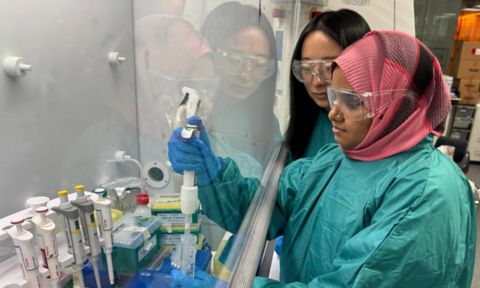RMIT launches Accelerator for Translational Research and Clinical Trials
Last month, the University launched the Accelerator for Translational Research and Clinical Trials (ATRACT), a research centre that empowers STEM researchers to translate excellence in fundamental research in cancer, immunology and infectious diseases into global impact.
Building a digitally skilled health workforce for improved patient outcomes
Senior social worker Mohammed Salman and theatre nurse Aleena Varughese are among 365 Grampians Health staff who have recently built up their digital skills in health.
Zapping stem cells could boost growth of new tissues and organs
Scientists in Melbourne have discovered how tiny electrical pulses can steer stem cells as they grow, opening the door to new improved ways of creating new tissues, organs, nerves and bones.
Blood test offers hope for more effective ovarian cancer treatment
A major collaboration has revealed a blood test to guide more effective ovarian cancer treatment, by identifying the women more likely to respond to a treatment known as PARP inhibitor therapy.
Tackling unprecedented pressures in Australia’s healthcare system
Australian universities are accelerating the adoption of new digital technologies in the healthcare system, as highlighted in a new report led by the RMIT-Cisco Health Transformation Lab.
MedTech at heart of Indonesia collaboration
RMIT’s expertise in medical technology (MedTech) is shaping new partnerships and initiatives designed to increase cooperation and collaboration in Indonesia’s healthcare sector.
Tiny metal particles show promise for targeted cancer treatments
An international research team led by RMIT University has created tiny particles, known as nanodots, made from a metallic compound that can kill cancer cells while leaving healthy cells largely unharmed.
RMIT Launches Allied Health Program to Fast-Track Healthcare Careers
RMIT's accelerated Allied Health Certificate fast-tracks students from the classroom to work-ready allied health assistants.











